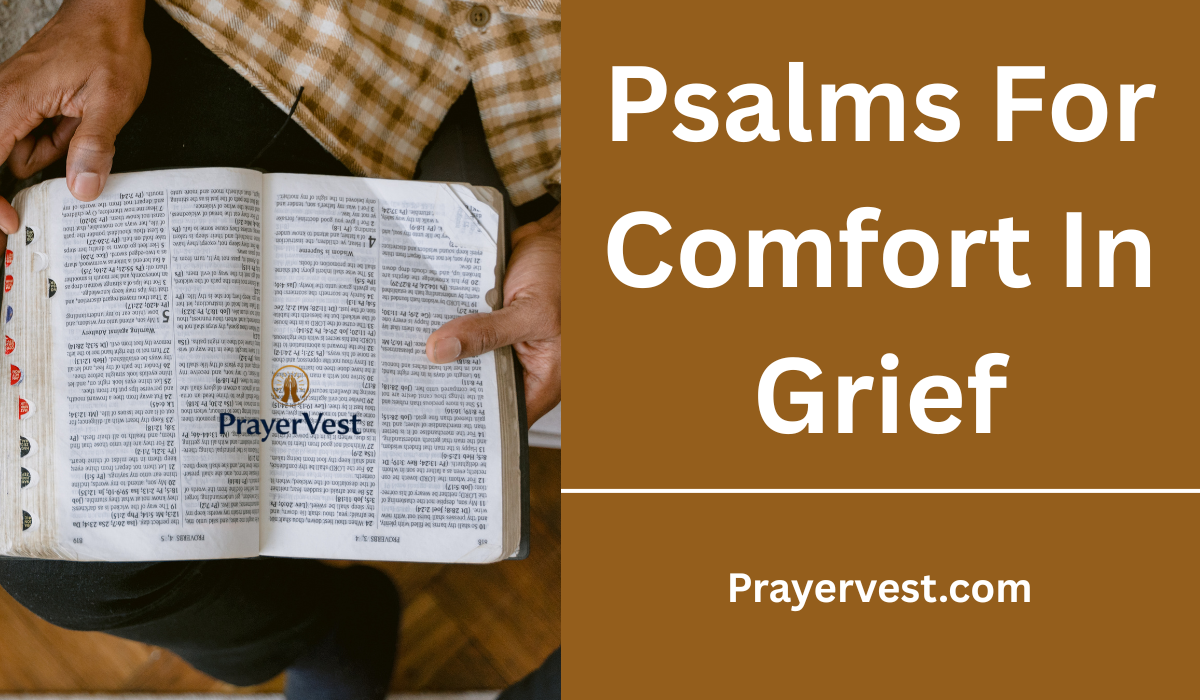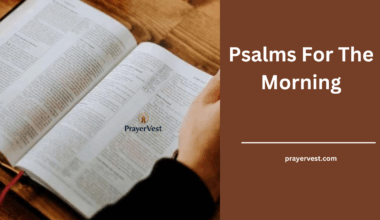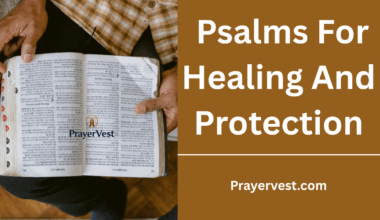The psalms for comfort in Grief affects every aspect of a person’s spirit and is a very unique and frequently overwhelming emotion. Grief leaves us looking for comfort, whether it is brought on by the death of a loved one, the breakup of a meaningful relationship, or the anguish of crushed dreams.
The book of Psalms are ageless emotions of grief, hope, and divine consolation that can reach where little else can in these tender moments, when words frequently fail. The psalmists, especially David, reminded us that we are not alone even in our most agonizing moments by openly and honestly sharing their hearts with God.
The Psalms’ beauty resides in their capacity to both affirm our suffering and raise our eyes toward recovery and reconciliation. They respect the human heart’s suffering without pressuring us to find a solution.
The promise that God sees our tears, hears our cries, and walks with us through every shade is provided by these holy verses, which meet us in the valley of grief. The Psalms offer a spiritual language for grieving and remembering, whether it is uttered in hushed tones throughout the night or through tears during prayer.


This collection of 50 powerful Psalms for comfort in grief is curated to bring strength, peace, and spiritual encouragement to the brokenhearted. Each verse serves as a gentle reminder that God is near to the hurting and that even the darkest seasons are held in His loving hands. As you meditate on these scriptures, may you find the comfort that only God’s presence can provide—the kind that doesn’t erase grief, but walks with you through it and carries you toward healing.
50 Most Effective Psalms For Comfort In Grief (2026)
1. Psalm 34:18
“The Lord is close to the brokenhearted and saves those who are crushed in spirit.”
This comforting verse is a direct reminder of God’s nearness during our darkest hours. When grief shatters our hearts and leaves us feeling isolated, this Psalm assures us that God is not distant or indifferent—He draws close. His saving presence meets us in our pain, offering divine comfort that no human words can match. It’s a promise that even in the crushing weight of sorrow, we are never alone.
Reflection
Grief can make the world feel silent and empty, but this verse speaks of a God who leans in even closer when our hearts are in pieces. His nearness is not just a theological truth—it is a lived experience for all who mourn. He doesn’t wait for us to heal before coming near; He meets us in the weeping. When we feel crushed by sorrow, we can lean on the truth that God’s compassion is strongest in our weakness. His closeness becomes the anchor that steadies us through the storm of loss.
2. Psalm 147:3
“He heals the brokenhearted and binds up their wounds.”
This verse portrays God as the ultimate healer of emotional and spiritual wounds. Grief often leaves open wounds that no earthly balm can soothe, but this Psalm reminds us that God’s tender care reaches those places we cannot articulate. He doesn’t merely acknowledge our brokenness—He heals it. He binds every gaping wound with divine hands that understand sorrow more deeply than we ever could.
Reflection
When the pain feels unending and no remedy seems strong enough to touch the ache, God steps in as the Great Physician. This healing isn’t always immediate or visible, but it is real and restorative. His presence can soften the rawest grief and bring peace where turmoil once raged. Though we may never be the same after loss, God’s gentle mending ensures we are never left shattered forever. We are held, tended to, and slowly made whole by the One who knows how to comfort every hurting heart.
3. Psalm 23:4
“Even though I walk through the valley of the shadow of death, I will fear no evil, for you are with me; your rod and your staff, they comfort me.”
This timeless Psalm affirms God’s companionship even in the most terrifying and grief-stricken moments. The “valley of the shadow of death” represents life’s darkest passages, where death is near and fear is real. Yet, even there, the psalmist declares a fearless confidence—not because the valley is easy, but because God is present. His protection and guidance provide deep, unshakeable comfort.
Reflection
Grief often feels like a long, shadowy valley with no clear path forward. But Psalm 23 invites us to walk through it—not alone, but with the Shepherd who never abandons us. His rod keeps us safe, and His staff keeps us near. This verse doesn’t promise a detour around grief, but it assures us of comfort within it. We can trust that the God who walks beside us in loss will lead us into peace. Even when the shadows feel overwhelming, His presence becomes our light.
4. Psalm 30:5
“Weeping may stay for the night, but rejoicing comes in the morning.”
This verse offers a hopeful reminder that grief is not forever. Though sorrow may linger, it is not eternal. The promise of morning symbolizes a fresh beginning, renewal, and the eventual arrival of joy. God acknowledges the legitimacy of our tears, but He also reminds us that they are not the end of our story. His healing work continues, and joy will break through again—often when we least expect it.
Reflection
Grief feels endless when you’re in the midst of it. Nights are long, and mornings may seem hopeless. But this verse anchors us in the truth that God’s rhythm includes both sorrow and restoration. Even if today is filled with tears, a new dawn is coming. God doesn’t rush our healing, but He faithfully leads us toward it. And when that morning comes—whether days, months, or years later—it will be a testimony to the resilience of the heart touched by His hand.
5. Psalm 42:11
“Why, my soul, are you downcast? Why so disturbed within me? Put your hope in God, for I will yet praise him, my Savior and my God.”
This verse gives voice to the inner struggle of grief—the conflict between deep sorrow and stubborn hope. The psalmist speaks to his own soul, acknowledging the weight of sadness, yet calling himself back to hope. This self-dialogue reveals a powerful spiritual truth: even in our most disturbed and downcast moments, we can choose to anchor ourselves in the steadfast hope of God.
Reflection
Grief affects not just our emotions but our very souls. It disturbs our inner peace, and yet this Psalm teaches us to speak hope into that disruption. Sometimes, faith means preaching truth to our own weary hearts. Though praise may feel impossible, the act of choosing hope becomes an offering in itself. It is in these moments—when we turn our gaze from the grave to God—that true healing begins to grow.
6. Psalm 55:22
“Cast your cares on the Lord and he will sustain you; he will never let the righteous be shaken.”
This verse is an invitation to lay down the heavy burden of grief at God’s feet. When sorrow threatens to crush us, God offers to carry what we cannot. He not only sustains us in our pain, but He secures us so we are not destroyed by it. This Psalm affirms that God is both a refuge and a source of strength in times of deep mourning.
Reflection
Grief can feel like an unbearable weight—but we were never meant to carry it alone. This verse invites us to cast it off, not deny it, and to place it fully in the hands of the One who can bear it all. God’s promise is not that we won’t feel shaken, but that we won’t be abandoned or overturned. When we release our burdens to Him, He faithfully upholds us. In grief, surrender becomes strength, and God’s sustaining grace becomes our daily bread.
7. Psalm 73:26
“My flesh and my heart may fail, but God is the strength of my heart and my portion forever.”
This Psalm acknowledges the frailty of human life and the emotional toll grief takes. Physical weakness and emotional collapse are part of the grieving process, but this verse redirects us to a source of strength that transcends our limitations. Even when our hearts fail us, God remains our eternal support and supply.
Reflection
In seasons of mourning, it’s normal to feel spiritually and emotionally depleted. Our hearts may be broken, our strength gone. But this verse points us to a sustaining truth: God doesn’t run out, fade, or falter. He becomes our inner strength when we have none left. When we lose people we love, God becomes our lasting portion—the One relationship we can never lose. In Him, our broken hearts find both rest and renewal.
8. Psalm 6:6
“I am worn out from my groaning. All night long I flood my bed with weeping and drench my couch with tears.”
This verse paints an honest and raw picture of grief. David expresses the depth of his sorrow without restraint, allowing us to see that tears and anguish have a place before God. Rather than hiding his pain, he pours it out in full. This Psalm gives us permission to grieve authentically, knowing that God does not despise our emotional honesty.
Reflection
In moments of deep grief, when sleep escapes us and tears seem endless, this verse resonates powerfully. It reminds us that we’re not alone in our suffering—others have walked this road and survived. God welcomes our groaning and tears; He does not ask us to suppress them. True comfort often begins with honest lament. As we cry out to Him, we create space for divine healing and hope to begin its slow but steady work.
9. Psalm 116:15
“Precious in the sight of the Lord is the death of his faithful servants.”
This verse brings profound comfort in the face of loss by affirming the value God places on every life. The death of a loved one is not unnoticed by heaven. Rather, it is deeply significant to the Lord. This reminds us that God grieves with us and honors the passing of His people. Their lives—and their deaths—are never meaningless to Him.
Reflection
When someone we love dies, we often ask if their life mattered and if anyone truly noticed their absence. This Psalm answers with a resounding yes. God not only notices—He cherishes. Every life is sacred in His eyes, and every death of a believer is met with divine reverence. Even as we mourn, we can find peace knowing our loved one’s memory is precious to God and their spirit is safe in His eternal care.
10. Psalm 31:9
“Be merciful to me, Lord, for I am in distress; my eyes grow weak with sorrow, my soul and body with grief.”
This verse encapsulates the all-consuming nature of grief, touching every part of our being—mind, body, and spirit. David cries out for mercy not only because of emotional pain but because sorrow has affected his whole existence. It is a heartfelt appeal to a compassionate God who understands suffering.
Reflection
Grief can exhaust us completely, leaving us emotionally, mentally, and even physically depleted. Yet here we see permission to plead for mercy when we can’t carry it anymore. God’s mercy is not reserved for the perfect or the strong—it flows especially for the distressed and the grieving. In the weight of our sorrow, we can cry out to the One who hears even the faintest groans of a hurting heart.
11. Psalm 13:1–2
“How long, Lord? Will you forget me forever? How long will you hide your face from me? How long must I wrestle with my thoughts and day after day have sorrow in my heart?”
This Psalm opens with a piercing cry that many grieving hearts know well—the cry of feeling forgotten or abandoned by God. David voices his agony with painful honesty, echoing the disorientation that loss often brings. Yet this raw cry is also an act of faith, because he brings it directly to the Lord.
Reflection
In seasons of grief, we may feel like God is distant or silent. But this Psalm teaches us that asking “How long?” is not a sign of unbelief—it’s a form of faithful lament. Grief tests the soul, but honest prayer invites God into the struggle. Even when answers seem far away, our cries are still heard. And sometimes, healing begins not with understanding, but with daring to speak our sorrow directly to the One who can bear it.
12. Psalm 10:14
“But you, God, see the trouble of the afflicted; you consider their grief and take it in hand.”
This verse reassures us that God sees our suffering and doesn’t ignore it. He doesn’t just notice our grief—He takes it in hand, meaning He actively involves Himself in our healing and restoration. The afflicted are not abandoned, but lovingly tended to by the God who cares.
Reflection
In moments of silent mourning, it’s easy to feel invisible. But this verse tells us otherwise. God doesn’t just see our pain—He handles it personally. His care is not passive but active, intentional, and full of purpose. When grief isolates us, God draws nearer still. He takes our broken pieces in His capable hands and begins the sacred work of mending what we cannot fix ourselves.
13. Psalm 94:19
“When anxiety was great within me, your consolation brought me joy.”
Here, the Psalmist acknowledges the inner storm of anxiety and emotional turmoil, but celebrates the way God’s consolation brought comfort and even joy. This verse doesn’t deny the pain—it celebrates the divine presence that soothes it. God meets us in the depths of our emotional suffering with supernatural peace.
Reflection
Grief is often accompanied by anxiety—fear of the future, the unknown, or of never feeling whole again. Yet God’s consolation isn’t merely a soft whisper; it’s a stabilizing presence that can transform our distress. His comfort doesn’t just numb the pain—it renews us with hope and unexpected joy. In the quiet moments of seeking Him, He replaces fear with peace and heaviness with the beginnings of joy.
14. Psalm 56:8
“You keep track of all my sorrows. You have collected all my tears in your bottle. You have recorded each one in your book.”
This tender image reveals the intimate care God has for our grief. Every tear we shed is noticed, collected, and remembered by Him. This verse speaks of a deeply personal God who treasures even the smallest expressions of our pain and keeps record of our every sorrow.
Reflection
Our tears are never wasted or unnoticed. They matter to the God who holds each one. In a world that often tells us to move on or be strong, God invites us to be seen and known in our full vulnerability. The image of God bottling our tears reminds us that He is emotionally invested in our healing. Our grief matters—because we matter deeply to Him.
15. Psalm 27:10
“Though my father and mother forsake me, the Lord will receive me.”
This verse speaks to one of the most painful aspects of grief—feeling abandoned or left alone. Even when those closest to us are no longer present, the Lord steps in with open arms. His love is constant, unwavering, and always welcoming, especially in the wake of deep personal loss.
Reflection
When we lose someone who gave us a sense of belonging—whether a parent, partner, or friend—it can feel like a part of our identity has been taken. But Psalm 27:10 assures us that God receives us fully. In our loneliness, He becomes our shelter. In our sorrow, He becomes our closest companion. His presence fills the voids we thought could never be filled. No matter who leaves, God remains.
16. Psalm 61:2
“From the ends of the earth I call to you, I call as my heart grows faint; lead me to the rock that is higher than I.”
This verse captures the cry of a weary heart, longing for stability and safety. The psalmist acknowledges his own frailty and seeks a higher place—an unshakable rock—that can offer protection and perspective beyond the chaos of grief.
Reflection
Grief can make us feel spiritually and emotionally disoriented, as if we’ve lost our footing. But in our faintness, God invites us to find rest in Him—the Rock who never moves. When we’re overwhelmed, He becomes our steady ground, lifting us above the floodwaters of sorrow. In Him, we are not just safe; we are upheld.
17. Psalm 9:9
“The Lord is a refuge for the oppressed, a stronghold in times of trouble.”
This verse emphasizes God’s role as both refuge and fortress—a protective shelter in the storms of life. For those grieving, He offers not only emotional support but also spiritual safety. God stands as a stronghold that cannot be breached by sorrow or despair.
Reflection
In times of intense grief, we often search for a place to rest our soul. Psalm 9:9 assures us that God is that place. He doesn’t merely offer a comforting word—He becomes a fortress we can run into. When the world feels unsafe, when our hearts feel fragile, He is the rock-solid refuge that guards and carries us.
18. Psalm 46:1
“God is our refuge and strength, an ever-present help in trouble.”
This foundational verse affirms God’s nearness in all seasons of distress. His help is not delayed or distant—it is present and powerful. In the heaviness of grief, we find not just sympathy but strength in the sustaining presence of God.
Reflection
Loss often makes us feel helpless. But Psalm 46:1 turns our eyes to a God who is both refuge and strength. We are not left to carry sorrow alone. His help is constant, His presence immediate. Even when words fail and strength fades, God does not. He becomes the power within us when we have nothing left to give.
19. Psalm 88:3
“I am overwhelmed with troubles and my life draws near to death.”
One of the darkest Psalms in the Bible, this verse is an unfiltered cry of despair. It reflects the intensity of grief, where pain is so deep it feels like life itself is fading. Yet even in this raw pain, the psalmist still speaks to God—showing us that prayer is possible, even when hope feels lost.
Reflection
Grief sometimes brings us to the edge of despair. Psalm 88 teaches that even our most anguished cries are sacred. God can handle our honesty. This verse doesn’t end in resolution, but it teaches us the power of presence—God listens, even when healing feels far off. Your suffering isn’t too dark for His light.
20. Psalm 126:5
“Those who sow with tears will reap with songs of joy.”
This verse offers a powerful promise: sorrow is not the end of the story. The tears we shed in times of grief are not wasted—they are seeds planted in faith. In time, joy will return, and it will be a harvest born of pain and perseverance.
Reflection
Tears are not signs of weakness; they are part of a divine process. Psalm 126:5 reminds us that every tear we cry in grief is noticed and nurtured by God. In time, what was sown in sorrow will be raised in joy. We may not see the harvest immediately, but we can trust that God is working behind the scenes to bring beauty from the ashes of our mourning.
21. Psalm 3:3
“But you, Lord, are a shield around me, my glory, the One who lifts my head high.”
This verse is a declaration of God’s protective and uplifting nature. When grief causes our heads to hang low in sorrow, God steps in as the lifter of our heads, restoring dignity, strength, and hope.
Reflection
Grief can make us feel defeated, bowed down by loss. But Psalm 3:3 offers a beautiful image of God’s healing love—He doesn’t just protect us; He lifts us. He restores our ability to look up, to move forward, and to live again. In every moment of heaviness, God is ready to raise your head with gentle strength.
22. Psalm 62:8
“Trust in him at all times, you people; pour out your hearts to him, for God is our refuge.”
This verse calls us to continual trust and honest expression before God. In grief, we are not required to be composed or perfect—we are invited to pour out our hearts completely. God, as our refuge, is a safe place for unfiltered sorrow.
Reflection
There is no “right” way to grieve, but there is a faithful way—and that way includes pouring your heart out to God. Psalm 62:8 encourages vulnerability before the only One who truly understands. When we hold nothing back from Him, we discover a depth of comfort and refuge that can sustain us through any season of mourning.
23. Psalm 4:8
“In peace I will lie down and sleep, for you alone, Lord, make me dwell in safety.”
This verse reassures us of God’s peace, even in the middle of emotional turmoil. Grief often disrupts rest, but here we find that God’s presence can provide a calming peace that transcends circumstances, allowing us to rest in safety.
Reflection
Sleepless nights are a frequent companion of grief. But Psalm 4:8 promises rest—not because all is resolved, but because we are kept by a God who watches over us. His peace allows our hearts to rest even when they are broken. Trusting Him with our pain makes room for the first quiet moments of healing.
24. Psalm 40:1-2
“I waited patiently for the Lord; he turned to me and heard my cry. He lifted me out of the slimy pit, out of the mud and mire; he set my feet on a rock and gave me a firm place to stand.”
This powerful testimony of deliverance assures us that God hears every cry and rescues us from the depths of despair. He doesn’t just pull us out—He places us on stable ground and renews our direction.
Reflection
Grief often feels like a pit we can’t climb out of, but Psalm 40 reminds us that God’s timing is perfect and His rescue is certain. Waiting on Him doesn’t mean abandonment—it means trusting that the One who hears our cry will soon lift us. When we are ready to rise, He gives us a firm place to stand again.
25. Psalm 18:28
“You, Lord, keep my lamp burning; my God turns my darkness into light.”
This verse captures the transformative power of God’s presence. Even in seasons of darkness, He keeps the flame of hope alive within us. In time, He will bring light back into places grief has darkened.
Reflection
Loss can extinguish joy and dim our outlook on life. But Psalm 18:28 assures us that God can rekindle what feels lost forever. He preserves the flicker of faith and breathes life back into our hearts. Slowly, the night of grief begins to fade, and the light of His love shines brighter, guiding us toward restoration.
26. Psalm 119:50
“My comfort in my suffering is this: Your promise preserves my life.”
In times of suffering, the psalmist turns not to worldly relief, but to God’s promises. His Word becomes the anchor that sustains life even when all else feels unstable. Scripture becomes not only guidance but a source of enduring comfort amid grief.
Reflection
When you’re grieving, the promises of God can feel like the only solid ground beneath your feet. Psalm 119:50 reminds us that His Word isn’t just a record of truth—it’s a living source of strength that holds us together. When emotions waver and sorrow floods the heart, the eternal promises of God preserve life and bring light to even the darkest valley.
27. Psalm 143:7-8
“Answer me quickly, Lord; my spirit fails. Do not hide your face from me… Let the morning bring me word of your unfailing love, for I have put my trust in you.”
This heartfelt cry reveals the desperation that often accompanies grief. The psalmist pleads for God’s presence and clings to the hope of His unfailing love to begin a new day. It’s an appeal for light to break through the darkness of mourning.
Reflection
There are times in grief when we feel like we cannot take another step unless God answers. Psalm 143 gives voice to that urgency and longing. Yet even in the weariness, there is trust—trust that morning will bring renewed love. This verse invites us to wake each day expecting God’s love to meet us in our suffering and gently carry us toward healing.
28. Psalm 77:1-2
“I cried out to God for help; I cried out to God to hear me. When I was in distress, I sought the Lord.”
This passage opens with an intense appeal to God, spoken from the heart of distress. It doesn’t mask the pain or frustration—it simply brings it to the One who can do something about it. Seeking God in grief is not a sign of weakness but of spiritual courage.
Reflection
Grief can drive us into silence or bitterness, but the psalmist shows us a better way: cry out. When we feel overwhelmed, turning to God in unfiltered prayer becomes the bridge between despair and hope. This Psalm reminds us that it’s okay to feel broken—we just don’t have to stay silent in that brokenness. God hears every cry, even when we don’t know what words to say.
29. Psalm 25:16-17
“Turn to me and be gracious to me, for I am lonely and afflicted. Relieve the troubles of my heart and free me from my anguish.”
In this poignant plea, David acknowledges both emotional and spiritual affliction. He asks for God’s grace to relieve the crushing weight of inner sorrow. It is an honest portrayal of the loneliness that often follows loss and an invitation for divine compassion.
Reflection
Loneliness is one of the quietest yet deepest aspects of grief. Psalm 25 reminds us that we can ask God to turn toward us when others turn away. His grace doesn’t just relieve circumstances—it touches the deepest aches of the soul. When grief isolates, God draws near with healing in His presence and freedom for anguished hearts.
30. Psalm 41:3
“The Lord sustains them on their sickbed and restores them from their bed of illness.”
While this verse speaks to physical illness, its deeper implication is one of restoration. God sustains those who are weakened—whether by physical, emotional, or spiritual affliction. Grief may not be an illness, but it certainly drains the soul in similar ways, requiring divine restoration.
Reflection
Grief often saps the strength from both body and spirit. Psalm 41 reminds us that God ministers to us in our weakest moments. He doesn’t rush the recovery—He sustains us through it. When we can’t stand emotionally or spiritually, God meets us in that frailty and begins His quiet work of restoration, one breath at a time.
31. Psalm 18:6
“In my distress I called to the Lord; I cried to my God for help. From his temple he heard my voice; my cry came before him, into his ears.”
This verse confirms that no prayer goes unheard, no tear unseen. Even when we feel abandoned or unheard, God is attentively listening. Our cries pierce heaven—not because of their eloquence, but because of God’s compassion.
Reflection
In the silent spaces of grief, it’s easy to wonder if anyone—including God—hears our pain. But Psalm 18:6 silences that fear. Our cries reach His ears, not out of duty, but because He cares. In every tear-soaked prayer, in every whispered “Why?”, God is listening. That alone is enough to begin healing.
32. Psalm 16:8
“I keep my eyes always on the Lord. With him at my right hand, I will not be shaken.”
This verse is a declaration of steadiness that comes from focusing on God. In grief, everything around us feels unsteady. Yet the psalmist reminds us that God’s presence offers unshakable support and peace, even in the darkest valleys.
Reflection
When everything else is falling apart, keeping our eyes on God becomes our lifeline. Psalm 16 doesn’t deny the presence of sorrow—it simply elevates the power of divine presence. With God by our side, grief doesn’t have the final word. We are not immovable by our own strength, but by the strength of the One who walks with us.
33. Psalm 147:1-2
“Praise the Lord. How good it is to sing praises to our God… The Lord builds up Jerusalem; he gathers the exiles of Israel.”
This verse highlights God’s restorative nature. He builds, He gathers, and He restores what was once scattered and broken. For those grieving, it is a comforting reminder that even after devastation, God is at work rebuilding our lives.
Reflection
After loss, we often feel like scattered pieces. But Psalm 147 shows us that God is in the business of gathering, restoring, and rebuilding. Even when we can’t see how it’s possible, He begins the process of making beauty from brokenness. He gathers every part of your story and knits it into something redemptive and strong.
34. Psalm 103:13-14
“As a father has compassion on his children, so the Lord has compassion on those who fear him; for he knows how we are formed, he remembers that we are dust.”
This verse speaks of God’s intimate understanding of our fragility. His compassion is not based on our performance, but on His knowledge of our design. He knows our limits and meets our sorrow with deep mercy.
Reflection
In grief, we often feel like we’re not strong enough—and that’s okay. Psalm 103 assures us that God isn’t demanding strength; He’s offering compassion. He remembers our weakness, because He created us. His response to our frailty isn’t condemnation—it’s mercy. In His loving eyes, your grief isn’t a flaw—it’s a moment He deeply understands.
35. Psalm 138:3
“When I called, you answered me; you greatly emboldened me.”
This verse reflects the spiritual strength God provides when we cry out to Him. Grief drains courage and hope, but God restores both, strengthening us to keep going even when it feels impossible.
Reflection
You may not feel brave in your grief, but God’s presence can embolden the faintest heart. Psalm 138:3 reminds us that prayer is not just a release—it’s a refilling. God answers not just with comfort, but with courage. He gives us the strength to stand, to heal, and to believe in joy again.
36. Psalm 37:23-24
“The Lord makes firm the steps of the one who delights in him; though he may stumble, he will not fall, for the Lord upholds him with his hand.”
This passage is a powerful reassurance for anyone who feels like they are barely holding on. Grief often makes us stumble in our faith and emotions, but God’s hand is always there to catch and uphold us.
Reflection
Healing is not a straight line—it’s full of stumbles. But Psalm 37 reminds us that stumbling doesn’t equal failure. God’s hand is steady, even when ours is weak. As you move through grief, know that you are held and upheld by the One who never lets go.
37. Psalm 112:7
“They will have no fear of bad news; their hearts are steadfast, trusting in the Lord.”
This verse speaks of a quiet, unshakable trust that steadies the heart even in the face of tragedy. The one who trusts in the Lord can endure bad news, sorrow, or sudden loss—not because grief is avoided, but because God remains constant through it.
Reflection
Grief often begins with the unexpected—bad news that shifts life’s foundation. But the Psalmist reminds us that we are not left defenseless. Trusting in God gives us a holy steadiness amid emotional storms. When our hearts are anchored in His goodness, even the heaviest sorrows won’t destroy us. Faith gives us resilience that fear cannot overcome.
38. Psalm 18:2
“The Lord is my rock, my fortress and my deliverer; my God is my rock, in whom I take refuge.”
This declaration portrays God as a place of safety, strength, and rescue. In grief, where stability is shaken and we long for security, this verse reminds us that we can run to God as our refuge and not be turned away.
Reflection
When the world feels dangerous or uncertain after loss, God becomes our stronghold. He is not just a temporary comfort, but a permanent place of shelter. In Him, we find firm footing again. He protects not by removing our grief but by surrounding us with His unyielding presence. We are safe in the arms of the Rock that never shifts.
39. Psalm 6:6
“I am worn out from my groaning. All night long I flood my bed with weeping and drench my couch with tears.”
This deeply personal lament expresses the rawness of grief. The psalmist does not hide his suffering—his nights are consumed by sorrow, his tears overwhelming. Yet this honesty becomes the very path that leads him to God.
Reflection
Grief is exhausting, both physically and spiritually. This verse shows that it’s okay to be undone. There is no shame in tears; in fact, God welcomes our honest mourning. Our groans, though wordless, are prayers. We are not alone in our midnight weeping—God hears, God sees, and God draws near.
40. Psalm 16:1
“Keep me safe, my God, for in you I take refuge.”
In just a few words, this verse expresses a plea and a promise. The psalmist seeks safety not in circumstances or people, but in the presence of God. It’s a reminder that true comfort in grief is found in spiritual refuge.
Reflection
Loss strips away false securities. What once brought comfort may now feel empty—but God never changes. In our most vulnerable moments, we can ask Him to keep us safe: emotionally, spiritually, and physically. His refuge is not always an escape from pain but a shelter where we are held through it.
41. Psalm 13:2
“How long must I wrestle with my thoughts and day after day have sorrow in my heart?”
This verse puts words to the lingering ache of grief. Sometimes it seems unending—thoughts race, emotions swirl, and sorrow becomes a daily burden. The psalmist gives voice to what many grievers feel: the tension between faith and pain.
Reflection
God invites our questions. “How long?” is a prayer of the grieving soul longing for relief. This verse assures us that we are not alone in that struggle. Grief may be long, but so is God’s compassion. In your wrestling, know that He holds you closely—never rushed, never dismissed, always present.
42. Psalm 19:14
“May these words of my mouth and this meditation of my heart be pleasing in your sight, Lord, my Rock and my Redeemer.”
This verse reminds us that even in grief, we can orient our inner life toward God. Our words, thoughts, and sorrow-filled meditations can become offerings of faith, given to a loving Redeemer.
Reflection
When you’re in grief, your thoughts may be chaotic, your prayers few. But God sees the intention of your heart. Turning your pain into a whispered prayer or a silent meditation honors Him. He is both your Rock—steady and unmoving—and your Redeemer, restoring what was lost.
43. Psalm 22:24
“For he has not despised or scorned the suffering of the afflicted one; he has not hidden his face from him but has listened to his cry for help.”
This powerful reassurance tells us that God does not ignore suffering. He does not turn His face away from grief, but listens intently to every cry. God’s response to sorrow is not distance but closeness.
Reflection
It can feel like no one understands your grief, but God sees every tear. He does not despise your pain; He draws near to it. You are not abandoned in your sorrow. He listens—not as a distant deity, but as a tender Father who leans in to every whispered ache.
44. Psalm 9:9
“The Lord is a refuge for the oppressed, a stronghold in times of trouble.”
Grief often brings feelings of oppression, loss of control, and inner turmoil. This verse promises that God becomes a fortified place in times like these. He is not just a listener, but a protector and shelter.
Reflection
When your heart is broken, God doesn’t offer platitudes—He offers presence. He is your hiding place, your stronghold. When life is unsteady, His character is your stability. Let Him shield your heart as you walk through the valley of sorrow.
45. Psalm 90:14
“Satisfy us in the morning with your unfailing love, that we may sing for joy and be glad all our days.”
This verse is a longing for renewal after hardship. The psalmist asks God to replace mourning with joy and to begin each day with the reminder of divine love. In grief, the hope of joy may seem distant—but God’s love never fails.
Reflection
Joy may not come easily in grief, but God’s love greets us anew every morning. In time, that love restores the ability to sing, to smile, to hope again. God doesn’t rush your healing—He renews it day by day. Let His love be your first light.
46. Psalm 77:2
“When I was in distress, I sought the Lord; at night I stretched out untiring hands, and I would not be comforted.”
This honest lament shows how even when we seek God, comfort may feel elusive. Yet the act of stretching out to God, even when comfort doesn’t come quickly, is still an act of faith.
Reflection
There will be moments in grief when even prayer feels hollow. But this verse reminds us: keep reaching. God sees your hands, your weariness, your tears. Even when you can’t feel comfort, He surrounds you with His presence. In time, that presence will bring peace.
47. Psalm 71:20
“Though you have made me see troubles, many and bitter, you will restore my life again.”
This verse acknowledges that suffering happens—even with God. But it also affirms that He is a God of restoration. After bitterness, He brings renewal.
Reflection
Grief makes us question whether life will ever feel whole again. But this verse carries the quiet promise of restoration. God knows what you’ve lost and what you carry. And in His time, He will breathe life back into the places that now feel empty.
48. Psalm 116:15
“Precious in the sight of the Lord is the death of his faithful servants.”
In loss, we may question the value of life and death. This verse reassures us that each life—and each death—is deeply meaningful to God. He honors the passing of His beloved ones.
Reflection
You are not alone in your grief. The one you lost was never invisible to God. Their life, and even their death, was seen, cherished, and precious in His eyes. This is not the end. In God’s love, death becomes a passage—not a disappearance.
49. Psalm 10:17
“You, Lord, hear the desire of the afflicted; you encourage them, and you listen to their cry.”
This verse offers reassurance that God is always attentive. The afflicted are never ignored or unheard. He listens to every cry—not with judgment, but with compassion and encouragement.
Reflection
In grief, we may feel voiceless. But God hears even the groanings too deep for words. He leans in, not away. He knows the language of sorrow and responds with gentle encouragement. Your cries matter. Your pain matters. And so does your healing.
50. Psalm 147:3
“He heals the brokenhearted and binds up their wounds.”
This beautiful verse encapsulates the entire message of comfort in grief. God does not stand far off; He heals and binds, gently tending to every wound of the soul. His heart is closest to those who are broken.
Reflection
God is the ultimate healer—not only of physical ailments but of emotional and spiritual wounds. If your heart is broken, you are His priority. Let Him bind up what is shattered, tend to what is bleeding, and gently restore you to life. Healing may take time, but it will come, for He is faithful.
Conclusion
The Psalms are a kind companion during times of intense grief; they are sincere in their suffering but unwavering in their optimism. They teach us that grieving is a normal expression of love and loss rather than a sign of weakness. The psalmists serve as a reminder that God never ignores our suffering, accepts our tears, and comprehends our quiet. Every sorrow contains an implicit call to go closer to the One who ties up the wounds of the brokenhearted and cures them. More than just beautiful words, the Psalms provide people enduring the darkness of bereavement with the living presence of God.
As you consider these 50 potent Psalms for grief relief, may God’s closeness bring you peace. Allow each verse to serve as a reminder that you are not forgotten, that your grief is not invisible, and that you can find healing. Even though sorrow may persist, God’s mercy endures. He offers us calm that is beyond comprehension and hope that rises like the dawn as he walks with us through every valley. The cord that tenderly guides you from grief to consolation is His promises, so cling to them.






